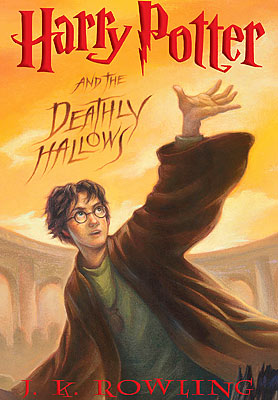Harry Potter Fiasco Could Jump-Start E-books
We have e-books... but we don't. I'll consider the e-book industry mature when a majority of books in print are available as e-books and every new best seller printed on paper gets a simultaneous e-book rollout.
Several problems have been holding e-books back. Until recently the digital e-book readers have been a big issue. E-readers have been both harder to read and less portable than a paper book. And electronic devices require power and are subject to glitches.
These problems are being addressed with the latest generation of e-readers. E-Ink technology produces a more crisp readable text that doesn't use power except to turn the page.
The multi-format war that always comes with new technology (think Beta-Max v. VHS and Blu-ray v. HD-DVD) is still being fought with e-books. May the best format win – and quickly, please.
The last hurdle to e-book adoption has been resistance from the publishers. It's understandable. E-books are thought to be more subject to digital piracy than paper-books. Publishers may have thought that publishing a digital book is doing half the work of the pirates.
 Harry Potter reveals this logic to be flawed. The New York Times reported yesterday that Harry Potter and the Deathly Hallows may have already been uploaded to file sharing services. Apparently somebody took the time to take digital photos of each page and then upload it.
Harry Potter reveals this logic to be flawed. The New York Times reported yesterday that Harry Potter and the Deathly Hallows may have already been uploaded to file sharing services. Apparently somebody took the time to take digital photos of each page and then upload it.
It would appear that - at least with best sellers - digital copies of books are going to be made whether or not publishers wish it. Just as the original illegal Napster forced the creation of the iTunes store and the new Napster, book piracy will force the maturation of e-books. And this is a good thing.
Publishers: Learn from the mistakes of the RIAA. Providing a legal alternative is better than making thieves out of your customers.



Comments
Hi. I'm a roleplayer.
The roleplaying market is peanuts compared to the general publishing market, but it has a devoted fanbase that continuously consumes its books. Watching their relationship to e-books, and mine, has been interesting.
The first primary objection was the FLGS idea, the "Friendly local (book) store." You had a place with nice people who could tell you what was up, and a nice location to hang out. I don't know how well this translates to the general market, but it was likely the biggest obstacle to e-books: You were supposed to support the local brick-n-mortar, not Amazon, and certainly not e-books.
But brick-n-mortar has been dying, and there's nothing the RPG industry can do about it. Amazon and e-books are just plain cheaper and, more importantly, allow you to hold onto old editions without taking up valuable shelf-space (the information storage capacity of a bookshelf is nothing compared to a server harddrive). Plus it gives "small publishers" a voice. There's a huge flourishing of independent writers right now, thanks to pdf files.
We use to have heavy DRM, for exactly the reasons you state above: Publishers were leery of theft. But DRM only stopped consumers from buying them, not thieves. Now they just watermark the book with your name, so if you turn around and put it on a P2P network, it's easy to track who started it (and yes, you can get rid of those. You can get rid of DRMs too)
Finally, portability is one of the big reasons I've switched to e-books. Having a hardcover in my hands is nice, but I've begun running games for people across the Atlantic, and it's much easier to send my friend a digital copy to put on her laptop and show people than it is to try to mail (or order) a hard copy.
A digital book + laptop means you can carry your entire library with you which, for a gamer with a substantial library, can be a big advantage.
Posted by: Vadept![[TypeKey Profile Page]](http://www.blog.speculist.com/nav-commenters.gif) |
July 18, 2007 01:15 PM
|
July 18, 2007 01:15 PM
Publishers may have thought that publishing a digital book is doing half the work of the pirates.
That's just silly. As you noted a pirate can take a picture, but the fargin' text is bounced all over the publishing house as 1s and 0s, the author sends it via email, the publisher transmits it to the printer ...
Several weak links in the chain - it only takes one disgruntled employee with a modest amount of tech savvy. Or if you're really dedicated a pirate with a sniffer. It's a safe bet that they don't encrypt the traffic at all.
Posted by: bdunbar![[TypeKey Profile Page]](http://www.blog.speculist.com/nav-commenters.gif) |
July 18, 2007 02:36 PM
|
July 18, 2007 02:36 PM
Bdunbar:
the fargin' text is bounced all over the publishing house as 1s and 0s, the author sends it via email, the publisher transmits it to the printer ...
Yeah, but they guarded this book like a state secret. There probably wasn't much bouncing around going on with this book.
Notice that the pirate in this particular case didn't release a text file. That would have been easy to do with a scanner and OCR. It was more important to him that he show that it was really the Potter book.
Posted by: Stephen Gordon![[TypeKey Profile Page]](http://www.blog.speculist.com/nav-commenters.gif) |
July 18, 2007 09:02 PM
|
July 18, 2007 09:02 PM